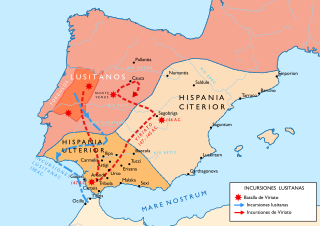Tautalus | |
|---|---|
| Native name | Tautalus, Tantalus, Tautamus |
| Born | Lusitania |
| Allegiance | Lusitania |
| Years of service | 139 BC |
| Battles/wars | Lusitanian War |
Tautalus was a chieftain of the Lusitanians, a proto-Celtic tribe from western Hispania. He succeeded Viriathus in the final year of the Lusitanian War.
Tautalus first emerged as a leader following the murder of Viriathus. His participation in the war was brief, and he was noted to lack Viriathus's tactical skills. [1] Leading the remnants of Viriathus's army, Tautalus marched against the city of Saguntum in the Roman province of Hispania Citerior, but the siege was unsuccessfully. After being repelled by the defenders, Tautalus and his forces turned against Hispania Ulterior, going down the Betis river, where Quintus Servilius Caepio met them with a numerically superior army. Tautalus and the Lusitanians were defeated and forced to surrender their weapons. However, after signing a peace treaty with Tautalus, Caepio assigned them lands in order for them to cease their rebel activities. [2] The Lusitanians were then settled by Decimus Junius Brutus in the colony of Valentia (possibly modern Valença do Minho or Valencia de Alcántara, if not the more geographically distant Valencia). [1]
The name Tautalus, as transmitted by Appian, is believed to derive from the Celtic and Germanic root teu, meaning "people." [3] However, there are some debate about whether Appian meant it to be Tautalus or Tantalus, as in the Hellenic name Tantalus. Similarly, Diodorus transmits the name as Tautamus or Tantamus. [3]
Decimus Junius Brutus Callaicus was a consul of the Roman Republic for the year 138 BC together with Publius Cornelius Scipio Nasica Serapio. He was an optimate politician and a military commander in Hispania and in Illyria. He was the son of Marcus Junius Brutus and brother of Marcus Junius Brutus. He had a son also named Decimus Junius Brutus and his grandson was Decimus Junius Brutus Albinus.

Viriathus was the most important leader of the Lusitanian people that resisted Roman expansion into the regions of western Hispania or western Iberia, where the Roman province of Lusitania would be finally established after the conquest.
The Lusitanians were an Indo-European-speaking people living in the far west of the Iberian Peninsula, in present-day central Portugal and Extremadura and Castilla y Leon of Spain. After its conquest by the Romans, the land was subsequently incorporated as a Roman province named after them (Lusitania).

The Vettones were an Iron Age pre-Roman people of the Iberian Peninsula.
This is a historical timeline of Portugal.
Servius Sulpicius Galba was a consul of Rome in 144 BC.
The First Celtiberian War and Second Celtiberian War were two of the three major rebellions by the Celtiberians against the presence of the Romans in Hispania.
The First Celtiberian War was the first of three major rebellions by the Celtiberians against the Roman presence in Hispania. The other two were the Second Celtiberian War and the Numantine War. Hispania was the name the Romans gave to the Iberian Peninsula. The peninsula was inhabited by various ethnic groups and numerous tribes. The Celtiberians were a confederation of five tribes, which lived in a large area of east central Hispania, to the west of Hispania Citerior. The eastern part of their territory shared a stretch of the border of this Roman province. The Celtiberian tribes were the Pellendones, the Arevaci, the Lusones, the Titti and the Belli.

The Lusitanian War, called Pyrinos Polemos in Greek, was a war of resistance fought by the Lusitanian tribes of Hispania Ulterior against the advancing legions of the Roman Republic from 155 to 139 BC. The Lusitanians revolted in 155 BC, and again in 146 BC and were pacified. In 154 BC, a long war in Hispania Citerior, known as the Numantine War, was begun by the Celtiberians. It lasted until 133 and is an important event in the integration of what would become Portugal into the Roman and Latin-speaking world.

Audax, Ditalcus and Minurus were Turdetanian warriors who participated in the Lusitanian War. They were the supposed betrayers and assassins of the Lusitanian leader Viriathus.
This section of the timeline of Hispania concerns Spanish and Portuguese history events from the Carthaginian conquests to before the barbarian invasions.
Quintus Fabius Maximus Servilianus was the adoptive son of Quintus Fabius Maximus Aemilianus and the natural son of Gnaeus Servilius Caepio --hence the adoptive cognomen Servilianus. He was consul of the Roman Republic in 142 BC together with Lucius Caecilius Metellus Calvus. He was the brother of Gnaeus Servilius Caepio and Quintus Servilius Caepio. All three brothers were commanders in the Roman Province of Hispania Ulterior and fought in the Lusitanian War.
Quintus Servilius Caepio was a Roman statesman. The son of Gnaeus Servilius Caepio, he served as consul in 140 BC alongside Gaius Laelius Sapiens. He was the father of Quintus Servilius Caepio.
Punicus was a chieftain of the Lusitanians, a proto-Celtic tribe from western Hispania. He became their first military leader during the Lusitanian War, and also led their first major victories against Rome.
Caesarus was a chieftain of the Lusitanians, a proto-Celtic tribe from western Hispania. He followed and later replaced Punicus as their major military leader during the Lusitanian War.
Curius and Apuleius were chieftains of the Lusitanians, a proto-Celtic tribe from western Hispania. They were active at the last phase of the Lusitanian War.
Caucenus was a chieftain of the Lusitanians, a proto-Celtic tribe from western Hispania. He was an important military figure during the earlier phase of the Lusitanian War.

Warfare in ancient Iberian Peninsula occupied an important place in historical chronicles, first during the Carthaginian invasion of Hispania, including the Punic Wars, and later during the Roman conquest of the peninsula. The densely bellicose character of the Pre-Roman peoples who inhabited Hispania was repeatedly shown in their conflicts against Rome, Carthage and each other.
Viriathus was a leader of Gallaecian and Lusitanian mercenaries in the Carthaginian army during the Second Punic War, according to Silius Italicus's poem Punica.

A Voz dos Deuses (ISBN 843-50-0587-9) is a historic novel by João Aguiar about the Lusitanian War. It takes the form of the written memories of Tongius, a Roman-Hispanic citizen and the high priest of the temple of Endovelicus in Lusitania, who relates his life, including his birth in the tribe of the Cynetes, his encounter with Lusitanian chieftain Viriathus, and his role as Viriathus's comrade-in-arms in the battle against the Roman Republic.